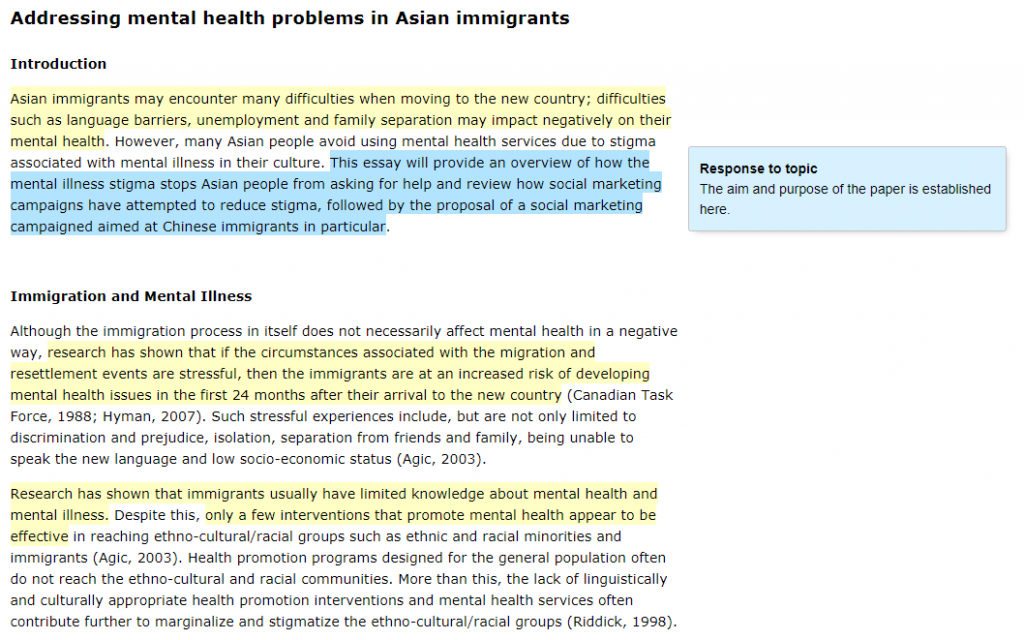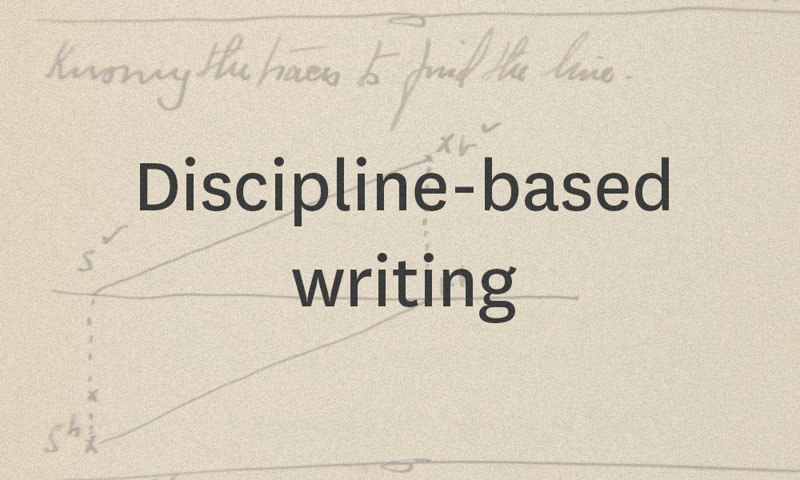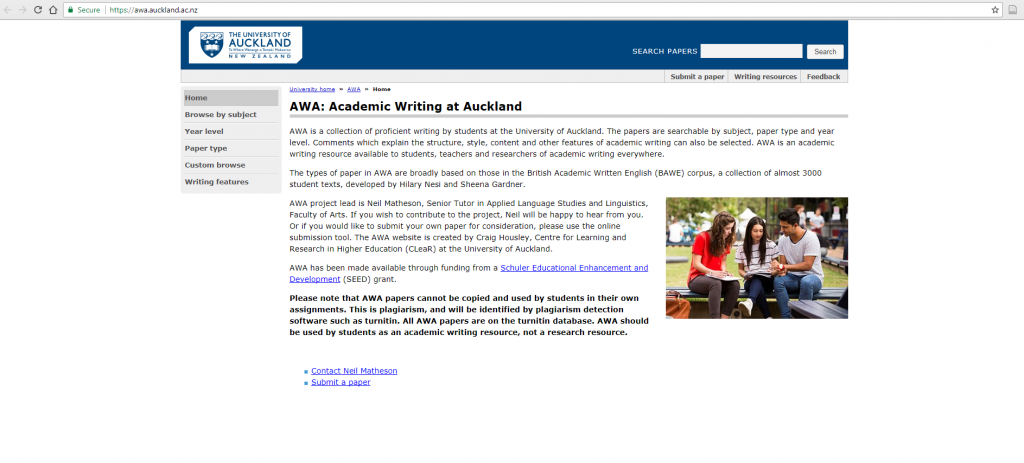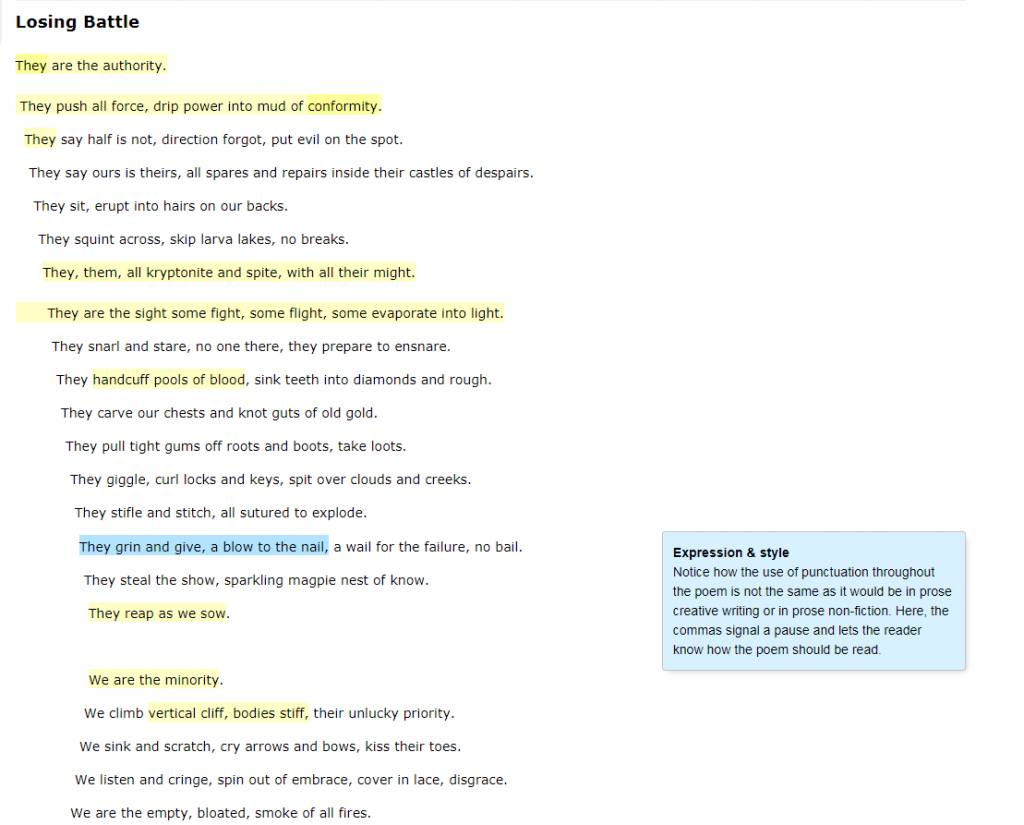A resource of teacher-annotated exemplary assignments
This project’s resources have been developed by Neil Matheson, teacher of Stage I course ENGWRIT 101 English Writing for Academic Purposes at the Faculty of Arts, University of Auckland.
These resources might be useful to undergraduate and honours students and teachers across the disciplines, looking for samples of annotated exemplary assignments.
The project was supported by the SEED Fund grants for 2017. You can watch Neil discuss his SEED project here.
For similar projects, see: Encouraging Collaborative Writing via Google Docs Analytics and Common, Discipline-Specific Elements of Proficient Student Writing.
Project background
As Neil explains in his original project application, “students new to university often find written assignments a challenge. A number of issues present themselves, including how to address the assignment question in the right way, how to structure the answer, how to incorporate other people’s ideas appropriately, how to write clearly and concisely, and how to write in a suitable way for that particular discipline. While writing by academics can be used as a guide, the writing of other students can provide an alternative and often more appropriate source of relevant academic texts at a level accessible for novice academic writers.” This motivated Neil to develop a textbank of proficient student writing to use as exemplars to other students. The resulting collection, The Academic Writing at Auckland (AWA), contains a searchable and browseable database of different types of assignments from across the disciplines, produced by students at various undergraduate and postgraduate stages. The types of texts include narrative essays, research reports, proposals, literature surveys, among others. Each type of text is briefly explained, and teacher-annotated sample essays are used for illustration. All the annotated AWA papers contain comments to explain seven commonly assessed features in writing:
- Response to topic
- Structure
- Idea Development
- Sources
- Referencing
- Coherence, and
- Expression and style.

Sample of exemplary student assignment (Proposal), with teacher comments filtered by type (here, looking at student’s Response to Topic)
Used initially to guide the on-going development of an academic writing course at the University, the AWA corpus has now been made available online thanks to the support of the SEED grant. As Neil explains, “Texts are searchable by subject, genre and writing features, and annotated with comments to illustrate and highlight structure, style, content and other academic features. The AWA corpus is available to students, teachers and researchers of academic writing at this university and beyond, making it an academic writing resource for the wider community.” See below for Neil’s reflection on his project.
Project reflection
University students can find academic writing challenging, and with most undergraduate writing unpublished, a lack of sample papers available to act as exemplars adds to the challenge. The Academic Writing at Auckland (AWA) corpus aims to rectify this. AWA is a collection of proficient University of Auckland student writing from across the university. Envisaged originally as a way to supplement learning materials for students in an academic writing course (English Writing 101), broader aims have also evolved. With increasing interest in English for Academic Purposes and academic writing in particular, the corpus aims to be a resource for high school and university students, first-language and second-language students, teachers and researchers of academic writing in New Zealand and elsewhere. As a medium of publication, AWA also provides a broad audience for student writers and exposure and publicity for University of Auckland subject content.
Challenges and achievements
A number of student papers had been collected before the SEED project began. This allowed the SEED work to focus on making the papers available online. We faced an initial problem when existing online platforms turned out not have the functionality required to display the papers effectively. This problem was overcome when CLeaR generously provided the expertise to develop a new, purpose-built platform. 340 papers have since been uploaded on this platform, which allows users to search papers by discipline, year level, type of paper or a customised combination of these. A search engine has been added to identify specific content. Another unique feature of the corpus is that 200 papers have been annotated with comments highlighting the way writers respond to the question, develop ideas, structure a paper, and employ features such as academic expression and style, source use, and referencing. Strong interest has been shown in the corpus by academic writing teachers at this university and in other New Zealand tertiary institutions, as well as teachers and researchers overseas. Two studies have been published to date based on AWA corpus data.
AWA-based learning
The SEED project is one stage in the broader development of AWA as an academic writing resource. Currently, anecdotal and Google Analytics evidence suggests English Writing 101 students use AWA when part of a paper is shown in a lecture and students want to see the whole text. Use of AWA in the course will grow as more online learning is incorporated, with text analysis tasks based on AWA papers. More broadly, as the corpus grows in size and awareness of the resource spreads, AWA has the potential to become established as a learning tool for students of academic writing everywhere. AWA has helped me too, for example during the process of annotating the papers. As AWA is aimed at a broad audience, comment templates required explanation of key aspects of academic writing in as simple and clear a manner as possible.
Future steps
AWA will continue to grow as more papers are added to the site. Information about AWA is being disseminated through colleagues, links on academic writing support sites and conference presentations. High schools will also be contacted. If possible, AWA will be expanded to incorporate writing from other New Zealand public tertiary institutions, making the corpus even more useful as a learning and research tool for student academic writing. The AWA project lead is Neil Matheson, Senior Tutor in Applied Language Studies and Linguistics, Faculty of Arts. If you wish to contribute to the project, Neil will be happy to hear from you.
Project resources
The Academic Writing at Auckland (AWA) website, can be found here.


